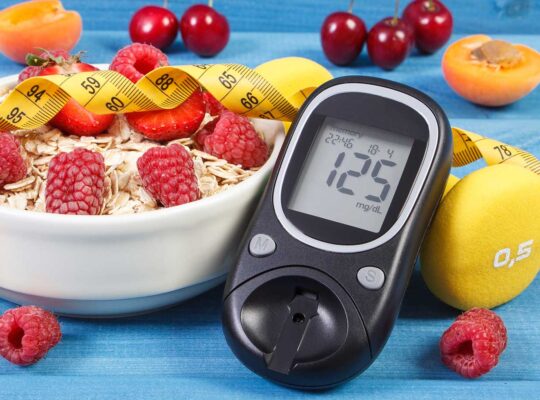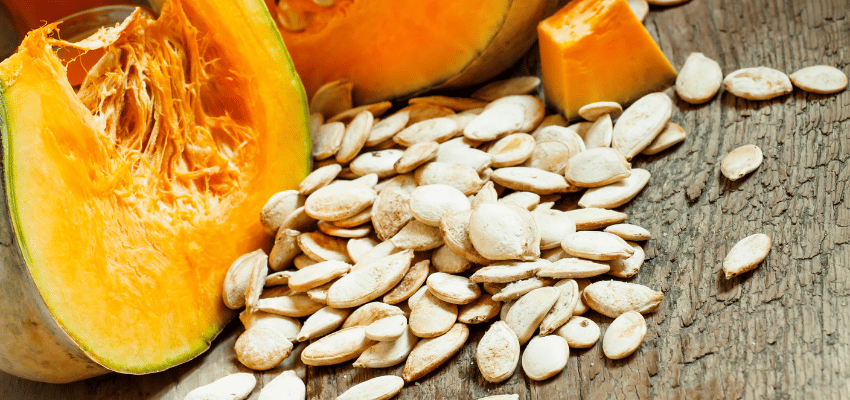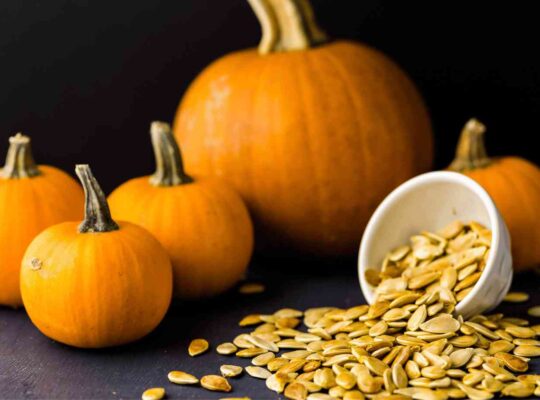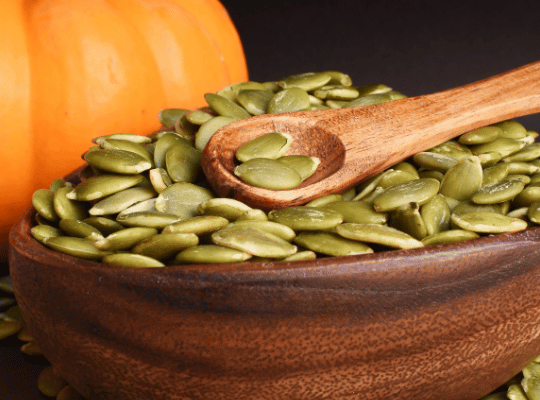Did you know that pumpkin seeds aren’t just tasty snacks but also have amazing health benefits? One of the biggest reasons to eat pumpkin seeds is because they can help lower inflammation (your body’s response to injury or infection). Pumpkin seeds are packed with special nutrients that help fight inflammation and keep your body healthy. In this article, we’ll explain how these little seeds work to reduce inflammation and why you should consider adding them to your diet.
1. Oleic Acid Ester of Hydroxy Oleic Acid (OAHOA)
Pumpkin seeds contain a special compound called Oleic Acid Ester of Hydroxy Oleic Acid (OAHOA). This might sound like a complicated term, but it’s really just a type of fatty acid (a healthy fat) that helps reduce inflammation in the body. It does this by blocking certain proteins called cytokines. These cytokines are normally helpful because they tell the immune system (the part of your body that fights off germs) to react when there’s a problem. But when your body makes too many cytokines, it can lead to chronic inflammation (ongoing swelling that can cause pain or illness). By lowering the number of cytokines, OAHOA helps reduce inflammation, which can be really helpful for people with conditions like arthritis (a disease that causes joint pain).
2. Linoleic Acid
Another important nutrient found in pumpkin seeds is linoleic acid. Linoleic acid is a type of omega-6 fatty acid (a kind of fat). Normally, omega-6 fats can sometimes cause inflammation, but when they’re balanced with omega-3 fatty acids (which are found in fish and flaxseeds), they actually help reduce inflammation. It’s all about balance! When your body has the right amount of both omega-6 and omega-3 fatty acids, linoleic acid helps your body stay healthy and reduces inflammation.
3. Tocopherols (Vitamin E)
Pumpkin seeds are also rich in tocopherols, which is just a fancy name for Vitamin E. Vitamin E is an antioxidant, which means it helps stop free radicals (unstable molecules that can damage your body’s cells). If too many free radicals build up in your body, they can cause oxidative stress (damage to your cells), which leads to inflammation. Tocopherols (Vitamin E) help protect your cells from this damage and keep inflammation in check. By lowering oxidative stress, Vitamin E can help keep you healthy and may even protect you from some serious diseases like heart disease.
4. Carotenoids
Pumpkin seeds also have carotenoids, which are natural pigments (the color found in plants) like beta-carotene. These compounds have been shown to help reduce inflammation by helping the immune system work properly. They also protect your cells from damage caused by oxidative stress, much like tocopherols. Carotenoids add even more anti-inflammatory power to pumpkin seeds, making them a great choice for people who want to fight inflammation and protect their health.
5. Phytosterols
Lastly, pumpkin seeds are a great source of phytosterols, which are plant-based compounds that look similar to cholesterol. Phytosterols help block cholesterol from being absorbed into your bloodstream, which can lower your cholesterol levels. But that’s not all—they also help reduce inflammation by keeping your immune system balanced. By adding pumpkin seeds to your diet, you can lower inflammation and support your heart health at the same time.
Conclusion
Pumpkin seeds are small, but they’re full of powerful nutrients that help reduce inflammation and keep your body healthy. They contain OAHOA, linoleic acid, Vitamin E (tocopherols), carotenoids, and phytosterols, all of which work together to fight inflammation. Whether you’re dealing with conditions like arthritis or just looking for a natural way to stay healthy, adding pumpkin seeds to your diet is a great choice. Share your experiences with pumpkin seeds and how they’ve helped you! And if you have any health concerns, don’t hesitate to reach out to a doctor or healthcare professional.
FAQs
- What makes pumpkin seeds good for reducing inflammation?
- Pumpkin seeds contain special compounds like OAHOA, Vitamin E, and carotenoids that help lower inflammation in the body.
- Can eating pumpkin seeds help with arthritis?
- Yes! The anti-inflammatory compounds in pumpkin seeds can help reduce joint pain and swelling caused by arthritis.
- What is linoleic acid, and how does it work in pumpkin seeds?
- Linoleic acid is an omega-6 fatty acid in pumpkin seeds. When balanced with omega-3s, it helps reduce inflammation in the body.
- What are tocopherols, and why are they important?
- Tocopherols are a type of Vitamin E found in pumpkin seeds that help protect your cells from damage and lower inflammation.
- How do phytosterols in pumpkin seeds help the body?
- Phytosterols not only help lower cholesterol but also reduce inflammation by balancing the immune system.
- Can pumpkin seeds protect against heart disease?
- Yes! The phytosterols and Vitamin E in pumpkin seeds can help lower cholesterol and reduce inflammation, which supports heart health.









